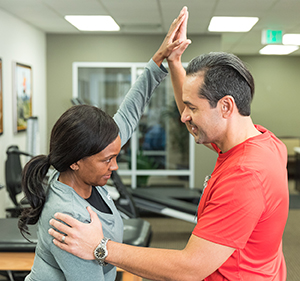A brain injury can affect other parts of the body. As a result, people who have a brain injury may have little or no control over their bodies. Muscles may weaken, tighten, or twitch. People may develop sensory problems, problems speaking, trouble with hand-eye coordination, and other problems. Some people may also have physical injuries that occurred along with the brain injury.
Improve posture and motion
Physical therapists help people regain movement and strength. Improving posture and range-of-motion exercises improve movement. In addition, they help prepare people to do tasks. For instance, a person may work on lifting an arm above the head. This may help them dress more easily.
You can help your loved one by:
-
Showing interest. Ask the therapist how you can help.
-
Reminding them to use good posture.
-
Making sure an affected arm or leg is supported in the correct position.
Reduce swallowing problems
If a person has trouble swallowing, a speech therapist may help them increase muscle control in the face, mouth, and throat. The person may also learn to turn or hold the head in a position that makes swallowing easier and safer.
You can help by:
-
Checking with a team member before bringing in food or drink. If your loved one has a swallowing problem, they may be on a special diet.
-
Limiting distractions during meals.
-
Taking smaller bites or sips.
-
Changing the texture of food, such as softening, chopping, or pureeing solid foods for easier swallowing.
-
Eating while sitting up only.
Reduce muscle and joint problems
Damage to the brain may tighten muscles (spasticity) or tendons (contracture). Sometimes an injury causes spasms that jerk or twist affected muscles (dystonia). Range-of-motion or stretching exercises may help control these problems. Sometimes casts or splints are used to hold a joint in the correct position. Over time, this may relax the muscle. Sometimes surgery is needed to release tight tissue. Medicines to help relax the muscles may be helpful for spasticity. Some people may find that a shot (injection) of Botulinum toxin into spastic muscles helps improve motion.
You can help by making sure:
-
Your loved one does any prescribed exercises or stretches daily.
-
The splint is on when it needs to be.
Seizure risk and safety
If your loved one is likely to have seizures, don't leave them alone in places where a seizure could cause severe harm. For instance, never leave them alone in a swimming pool or bathtub. Assess other places and situations for risk as well.
Control seizures
If too many signals flood the brain, a seizure may occur. Medicines may control these episodes. A brain injury increases the risk of seizures.
You can help by doing the following during a seizure:
-
Help the person into a safe position. Make sure your loved one will not fall or hit their head.
-
If they are lying down, turn them to the side with mouth pointed down.
-
Don't restrain the person or put anything in their mouth.
-
Tell a team or staff member.
Call 911
Call 911 if a seizure lasts more than 5 minutes.


